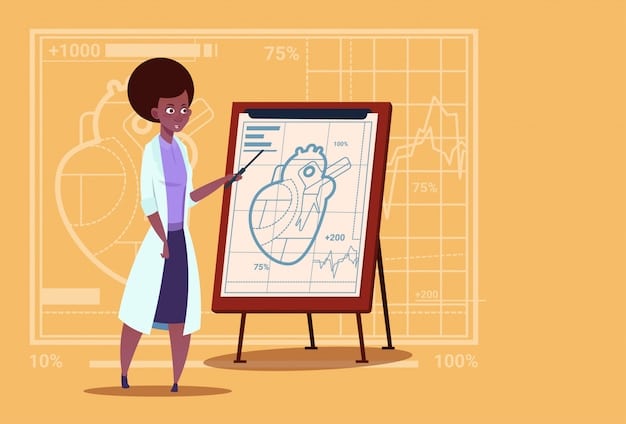The Latest on Heart Health: What to Know in 2025

The Latest on Heart Health: What You Need to Know in 2025 encompasses evolving research on cardiovascular disease prevention, innovative treatments, emerging technologies in diagnostics, and the impact of lifestyle modifications for improved heart health outcomes.
Staying informed about your heart health is crucial, and **The Latest on Heart Health: What You Need to Know in 2025** provides a guide to the most recent advancements and actionable steps for maintaining a healthy heart.
Understanding the Evolving Landscape of Heart Health
Heart health is a dynamic field, with continuous research and advancements shaping our understanding and approaches to cardiovascular care. Keeping abreast of these changes is essential for making informed decisions about your well-being.
Key Trends Shaping Heart Health in 2025
Several trends are poised to significantly impact heart health in the coming year. These include technological advancements, personalized medicine, and a greater emphasis on preventive strategies.
- Wearable Technology Integration: Expect more sophisticated wearable devices that offer continuous heart monitoring and personalized feedback.
- Genomic Insights: Advances in genomics may provide more accurate risk assessments and tailored treatment plans based on individual genetic predispositions.
- Telehealth Expansion: Telehealth services are expected to grow, improving access to cardiac specialists and remote monitoring capabilities.
Understanding these trends can empower individuals to take proactive steps in managing their heart health and seeking timely interventions when necessary.

Preventive Strategies for a Healthier Heart
Prevention remains the cornerstone of maintaining optimal heart health. Adopting a lifestyle that supports cardiovascular function can significantly reduce the risk of heart disease.
Lifestyle adjustments, such as diet and exercise, can drastically improve your heart health.
Dietary Recommendations for Heart Health
A heart-healthy diet focuses on limiting saturated and trans fats, cholesterol, and sodium, while emphasizing nutrient-rich foods.
A balanced diet is essential for maintaining peak health.
- Emphasize Fruits and Vegetables: These are rich in vitamins, minerals, and antioxidants that support heart health.
- Choose Whole Grains: Opt for whole grains over refined grains to benefit from fiber and nutrients.
- Limit Processed Foods: Reduce your intake of processed foods, which are often high in sodium, unhealthy fats, and added sugars.
Making simple swaps, like choosing baked instead of fried foods, can contribute significantly to heart health.
Advancements in Diagnostics and Monitoring
Early and accurate diagnosis is crucial for effective heart disease management. Advancements in diagnostic technologies are improving our ability to detect cardiovascular issues earlier and more accurately.
Novel diagnostic methods are leading to earlier detection and more effective treatment.
Emerging Diagnostic Tools and Techniques
Several innovative tools and techniques are transforming the landscape of cardiac diagnostics. These include advanced imaging modalities, biomarker analysis, and AI-powered diagnostic support.
- Cardiac MRI: Offers detailed images of the heart structure and function, aiding in the diagnosis of various cardiac conditions.
- Biomarker Analysis: Advanced blood tests can identify specific biomarkers indicative of heart damage or inflammation.
- AI-Powered Diagnostics: Artificial intelligence is being used to analyze diagnostic data, improving accuracy and efficiency.
Staying informed about cutting-edge diagnostic options can influence treatment decisions and improve overall outcomes.

Innovative Treatment Options for Heart Disease
The treatment landscape for heart disease is constantly evolving, with new therapies and technologies offering hope for improved outcomes. From minimally invasive procedures to targeted drug therapies, patients now have more options than ever before.
Modern treatments are now more advanced and effective than ever.
Exploring Advanced Cardiac Therapies
Advancements in cardiac therapies are providing new avenues for managing and treating heart disease. These include minimally invasive procedures, gene therapies, and regenerative medicine approaches.
- Minimally Invasive Procedures: Techniques such as transcatheter aortic valve replacement (TAVR) offer less-invasive alternatives to traditional open-heart surgery.
- Gene Therapies: Emerging gene therapies hold promise for correcting genetic defects that contribute to heart disease.
- Regenerative Medicine: This field focuses on repairing damaged heart tissue using stem cells and other regenerative approaches.
Discussing these treatment options with your cardiologist can help you determine the most appropriate approach for your unique situation.
The Role of Technology in Heart Health Management
Technology is playing an increasingly vital role in heart health management, providing tools for monitoring, diagnosis, and even treatment. From mobile apps to remote monitoring devices, technology is empowering individuals to take a more active role in their cardiovascular care.
Technology is revolutionizing heart health management through mobile apps and remote monitoring.
Consider engaging with helpful technology that can aid you on your journey to becoming healthier.
Leveraging Digital Health Tools
Digital health tools are transforming how we manage heart health, offering convenient and accessible ways to track vital signs, receive personalized feedback, and connect with healthcare providers.
These include a number of important features.
- Mobile Health Apps: Apps that track heart rate, blood pressure, and physical activity can help individuals stay on top of their cardiovascular health.
- Remote Monitoring Devices: Wearable devices and implantable monitors provide continuous data to healthcare providers, enabling timely interventions.
- Telehealth Consultations: Virtual appointments with cardiologists offer convenient access to expert advice and monitoring.
Integrating these tools into your heart health regimen can lead to better awareness, adherence, and outcomes.
Understanding and Managing Risk Factors
Effectively managing risk factors is crucial for preventing or delaying the onset of heart disease. Understanding your personal risk profile and taking proactive steps to address modifiable risk factors can significantly impact your long-term cardiovascular health.
Controlling cholesterol and avoiding tobacco are essential for preventing heart disease.
Let’s highlight some important facts.
Key Risk Factors for Heart Disease
Several key risk factors contribute to the development of heart disease. These include high blood pressure, high cholesterol, smoking, obesity, diabetes, and physical inactivity.
- High Blood Pressure: Managing blood pressure through lifestyle changes and medication is essential for reducing the risk of stroke and heart attack.
- High Cholesterol: Lowering cholesterol levels through diet, exercise, and medication can help prevent plaque buildup in the arteries.
- Smoking: Quitting smoking is one of the most effective steps you can take to improve your heart health.
Addressing these risk factors through lifestyle modifications and medical interventions can significantly reduce your risk of heart disease.
| Key Point | Brief Description |
|---|---|
| 🏃♀️ Exercise | Regular physical activity lowers heart disease risk. |
| 🍎 Diet | Focus on fruits, vegetables, and whole grains. |
| 🩺 Monitoring | Use technology to track heart health metrics. |
| 🚭 Quit Smoking | Quitting smoking has an immediate and lasting impact on cardiovascular health. |
Frequently Asked Questions
▼
Focus on a balanced diet rich in fruits and vegetables, engage in regular physical activity, quit smoking, and manage stress. These changes can significantly reduce your risk of heart disease.
▼
The frequency of cholesterol checks depends on your risk factors and age. Generally, adults should have their cholesterol checked every 4 to 6 years. Consult your doctor for personalized recommendations.
▼
Early warning signs can include chest pain or discomfort, shortness of breath, palpitations, dizziness, and fatigue. If you experience these symptoms, seek medical attention promptly.
▼
Wearable devices can provide valuable insights into your heart rate and activity levels. However, they are not a substitute for medical-grade monitoring. Discuss the data with your healthcare provider for accurate assessment.
▼
Genetics can play a significant role in heart disease risk. If you have a family history of heart disease, it’s essential to discuss this with your doctor and take proactive steps to manage other risk factors.
Conclusion
Staying informed about **the latest on heart health** empowers you to make proactive choices that can significantly improve your cardiovascular well-being. By embracing preventive strategies, leveraging technological advancements, and understanding your personal risk factors, you can pave the way for a healthier, longer life. Always consult with your healthcare provider for personalized advice and treatment plans.





